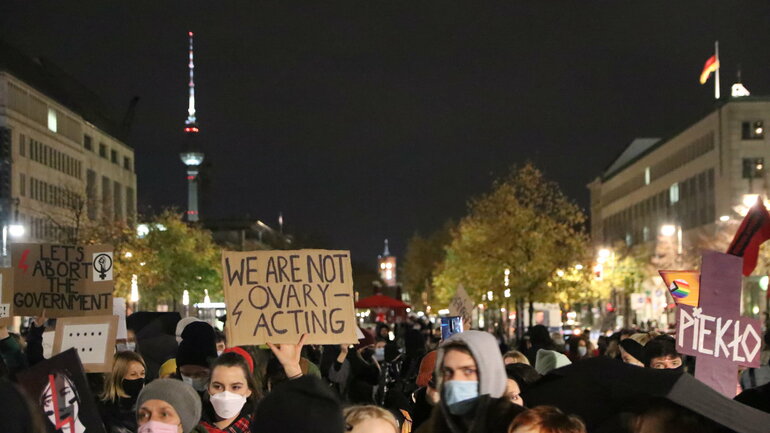Three keywords to better understand the Polish abortion protests

On 22 October, Poland’s disputed new Constitutional Tribunal, whose members were appointed by Law and Justice (PiS), the country’s ruling right-wing party, banned nearly all abortions. This decision instantly sparked protests and strikes across Poland. Hundreds of thousands of women were joined by various supporters, including public transport workers, miners, and farmers. On 30 October, the largest demonstrations in decades paralysed the capital city of Warsaw.
While the Covid-19 pandemic poses a global medical emergency, a near-total ban on abortions represents another healthcare crisis that is unfolding in Poland. Despite a surge in Covid-19 cases in the country, mass anti-government protests continue every day. Most take place outdoors, except those in churches. Three keywords help explain the dynamics of this political upheaval: Wypierdalać, apostasy, and Berlin.
Wypierdalać!
Language is a key tool in public debates about abortion, and both feminist activists and anti-choice campaigners are well aware of its power. The tribunal’s highly controversial decision to ban terminations in cases of serious foetal abnormalities followed a media campaign that promoted the provocative term ‘eugenic abortion’ to describe such cases. This is an example of right-wing populism taking over the language of public debate in Poland.
However, the emotive function of language works both ways, and the current wave of mass protests shows a switch in the rhetoric of anti-government demonstrations. Compared with other mass protests in Poland in recent years, the anger of the latest protest wave is more intense. The protesters’ main slogan is a blunt ‘Wypierdalać!’ (‘Get the f*** out of here!’). With the equally unapologetic ‘Jebać PiS’ (‘F*** PiS’), this slogan expresses wider dissent towards the ruling party.
Polish women and their allies have become furious and uncensored. They quickly declared ‘This is war!’, in a reference to the book of that title by Klementyna Suchanow. The book exposes deep international connections among fundamentalist Christian lobby groups that fund anti-abortion and anti-LGBT campaigns across Central and Eastern Europe. From outrage and humour in messages on home-made banners to the sounds of techno music, samba drums, and folk anthems, new creative forms of social mobilisation have taken over the streets of Polish cities, towns, and even villages.
Apostasy
The Roman Catholic Church in Poland was not at the forefront of the initiative that led to the recent tightening of the country’s abortion law. However, its role in fuelling this move is obvious to many in Poland. More broadly, the church has been criticised for engaging in national politics, receiving enormous donations of public money, and protecting paedophile priests.
As a result, the church has been one of the main targets of the rage sparked by the new law. Services were disrupted, churches were sprayed with slogans, and demonstrations were staged in front of the institution’s administrative buildings. The video above echoes this anger when the performer sings ‘Wara od nas wiaro!’, a strong imperative that could be translated as ‘Religion, stay the hell out of us!’.
Interestingly and somewhat unexpectedly, the anger towards the church has also resulted in thousands of people searching for instructions on how to formally leave the Catholic Church. In the days after the new law was passed, Google searches for ‘apostasy’, ‘apostasy procedure’, and ‘apostasy how’ skyrocketed in Poland. The hashtag #Apostazja spread across social media, accompanied by infographics showing how to quit the institution.
The decision to leave the church may be motivated by anger and disappointment, but it is also a political move. Although Poles have for years been becoming less religious, the church still underpins its mandate and privileged position by claiming that over 92 per cent of the population is Catholic. A campaign with the hashtag #ApostazjaChallenge aims to show that this number, which includes anyone baptised as an infant, does not reflect the true level of support for the church. Even many believers are fed up with the ultra-conservative, misogynistic, and homophobic rhetoric and actions flowing from the hierarchies of the Polish clergy.
Berlin
Berlin is an important site on the map of the current protests. This is not only because the city has a large Polish community with many vibrant Polish organisations and informal groups but also because it is one of the major destinations for people who have been denied an abortion in Poland. Those unable to make arrangements themselves can get help from Ciocia Basia, a local collective run by Polish women. This grass-roots initiative now has sister organisations in Vienna and Prague. Such networks are a counterbalance to conservative alliances in the region.
Berlin is also home to Julia Przyłębska, who heads Poland’s disputed new Constitutional Tribunal and is a central figure responsible for the new law. Married to the Polish ambassador to Germany, Przyłębska lives in a villa in Dahlem, an upmarket neighbourhood of Berlin, which has now witnessed a series of protests targeting the judge.
At ZOiS, the MOBILISE project aims to understand why, in crises, some people take to the streets while others decide to emigrate. The case of Berlin shows that the linkages between migration and protest can be complex. Over two weeks, a series of protests organised by local Polish activists from the collective Dziewuchy brought together hundreds of Polish migrants in the city. Some of them then travelled back to Poland, despite the Covid-19 pandemic, with the sole purpose of taking part in protests there. Together with boycotts of the church and the candour of the protests, solidarity across borders has brought vigour to the recent wave of public dissent that is shaking the country.
Marianna Szczygielska is a postdoctoral fellow at the Max Planck Institute for the History of Science.
Piotr Goldstein is a researcher at ZOiS.
This text includes research conducted as part of the MOBILISE project, which is funded by the German Research Foundation (DFG).
